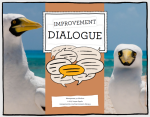Agile Management - Complexity Thinking View more presentations from Jurgen Appelo.

From Appreciative Inquiry to Complexity Thinking
We would do well to consider some of the principles of Appreciative Inquiry in our efforts to improve our organizations.
I appreciate the importance of catalyzing each other’s performance in an organization, and I think it’s worth finding out what kind of approach we need as a coaches, managers, or pairing partners. In my research I was fortunate to find a useful method that offers great inspiration when focusing on positive organizational change, with several similarities to complexity thinking.
Appreciative Inquiry
The method of Appreciative Inquiry evangelizes that inquiry is the engine of change, but that traditional problem-solving processes in human systems have a tendency to worsen the problems they are trying to solve. The method says that “objective” inquiries are impossible and that all social analysis is inherently biased by the perspective of the observer.
In Appreciative Inquiry the idea is to stop focusing on “what is wrong” and instead wonder about “what is possible”. It tells us that people co-create their organizations through stories, and to improve organizations we must therefore improve our conversations. It says that an inquiry into a human system will automatically change that system, and it claims that organizations grow in the direction of the questions that people ask of each other.
Appreciative Inquiry holds that sustainable change requires a positive attitude and positive relationships. Instead of negation, criticism, and dissent it tries to foster positive change by bringing out the best in people, strengthening the affirmative capability of the organization, and building momentum around a shared purpose. (see: Appreciative Inquiry: A Positive Revolution in Change)
Complexity Thinking
Haven’t we heard this before? Didn’t we already know about the observer influencing the system, the problem of vicious feedback cycles, enabling change through storytelling, and seeing organizations as networks of relationships?
Though explicit references to complexity science are missing, the articles about Appreciative Inquiry certainly seem to breathe complexity thinking all over. We would do well to consider some of its principles in our efforts to improve our organizations. This means, focusing on positive dialogues, and tapping into the potential of participants, while being aware of the influence of the observer.
 This text is part of the article Improvement Dialogue, which is a chapter in the Management Workout book. Do you want exclusive access to my latest writing? Subscribe to the mailing list!
This text is part of the article Improvement Dialogue, which is a chapter in the Management Workout book. Do you want exclusive access to my latest writing? Subscribe to the mailing list!



